Ratchet and Clank: Rift Apart on PS5 Pro - a straight upgrade for the performance RT mode
With the possibility of more to come from final code.
Ratchet and Clank: Rift Apart is still an absolute technical highlight on the standard PS5. Combining beautiful animation, fantastic modelling, and excellent lighting tech - including a pioneering implementation of RT reflections - the game still ranks among the best-looking titles on the platform. However, in classic current-gen fashion, developer Insomniac offers multiple modes, each with their own trade-offs in terms of graphical features, performance and image quality. The brand new PS5 Pro patch aims to make that choice a lot simpler, giving players the combination of RT reflections, fine image detail and 60fps performance on PS5 Pro. Does this upgrade elevate Rift Apart from its base console counterpart? And how close does it come to matching the PS5 fidelity mode?
The most relevant point of comparison with Pro is the base PS5's performance RT mode, because both offerings run at 60fps and feature excellent RT reflections. This mode offers a 1440p-like image on PS5 and is arguably the best experience overall on the base console.
The biggest improvement on Pro comes down to the way the final image resolves, with PSSR upscaling taking Ratchet from circa 1584p to a full 4K final image versus a 1440p internal res on the base machine (Both modes make use of DRS and use lower-res post processing too). On fine elements of geometry, the difference can be stark, with the Pro resolving cleaner lines with more detail thanks to that higher internal resolution and better upscaling tech.
The performance RT mode features a substantial pass of post-process sharpening to give a greater perception of detail across the image. On PS5 Pro, there's better overall detail, but without the artificial-looking edge ringing and additional breakup often associated with sharpening. According to Insomniac core technology director Mike Fitzgerald, the PSSR technique used on Pro resolves enough detail that the sharpening used on the base PS5 isn't necessary.
RT reflections also resolve much more cleanly on the Pro console. These reflections had a grainy appearance on the base console, with checkerboard-like patterns sometimes visible in reflective detail. PS5 Pro can look slightly softer than the base console here, but the RT resolve is more stable. There's also much less aliasing in areas like bevelled edges on glossy surfaces and on the borders of glossy materials in general. That results in a more coherent and realistic image, especially with changes to noise and dithering patterns that feed into the RT reflections on PS5 Pro.
One possible side effect of the updated reflections is that they tend to suffer from more ghosting than their PS5 counterparts, so moving objects or camera movements can lag behind a bit more obviously than on PS5. RT lacks motion vectors, which temporal upscalers expect, so PSSR is given a pretty tough task here. The Pro emphasises coherent reflections at rest with minimal aliasing, possibly at the cost of more blurry reflections during movement. Reflections overall still look a good deal better on Pro though.
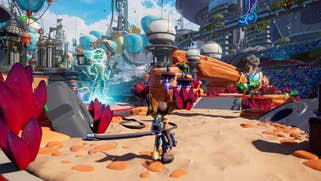
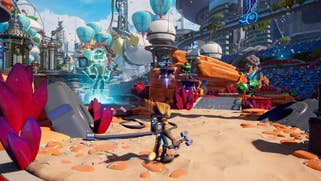


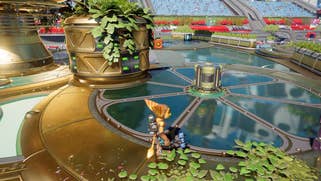




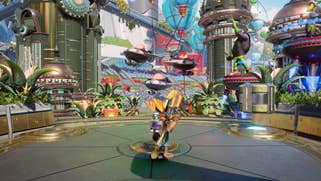
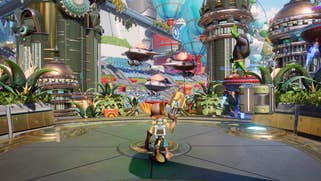
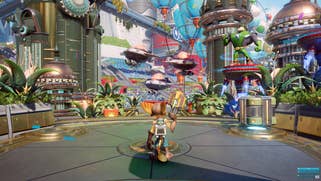
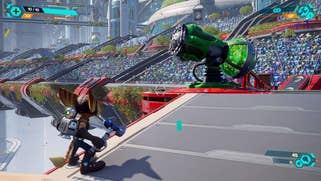
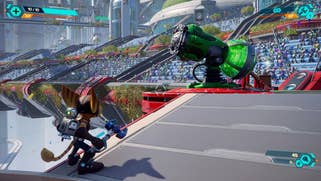
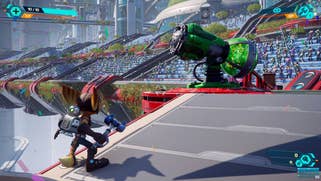
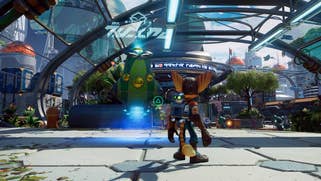
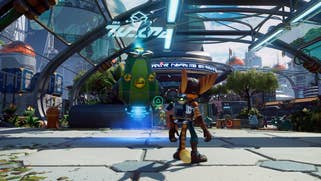
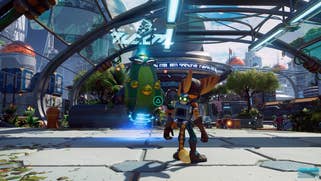
PS5 Pro also does better at resolving particle effects, such as the confetti shown in the opening moments of the game at the Festival of Heroes. On base PS5, the confetti particles fade in and out of existence as they move through the air, while on PS5 Pro they appear much more coherent. This is another area where the lack of motion vectors creates somewhat sub-par results with the IGTI (Insomniac Games temporal injection) technique used on PS5. Other particle effects like flares also appear smoother and less aliased on Pro.
Vegetation also generally looks better on Pro, with more foliage detail at range and more minor changes up close. The higher-frequency patterns of detail in the foliage before didn't interact all that favourably with image sharpening, so it tended to have a bit of an oversharpened image on the base machine relative to Pro. Some distant trees do look a bit less stable, with noise that we don't get with IGTI on the base model. I also noticed that some grass with temporal artefacts, perhaps as visual evidence of a kind of jittering process.
When it comes to movement, the results are mostly positive. Complex animation, like the wrench-swinging animation on Ratchet, resolves with much less aliasing on Pro and produces a clean and more quickly coherent result in comparison. Getting this to look good is a pretty tall order, given the fast animation with complex movement and constant occlusion and disocclusion, but PSSR is delivering a satisfying result. We also see very favourable results in the crowds at the parade, where clapping characters look clean even under close scrutiny. IGTI tends to have somewhat noisy disocclusion fizzle, much like we might see with FSR, so the result on Pro is superior. That isn't to say that there's no room for improvement on Pro, but its issues tend to be restricted to minor moments or distant scenery.
When moving through a scene, there's usually less aliasing on the Pro, though neither platform offers a perfectly stable result. The biggest difference comes in scenes with prominent RT reflections, where the Pro does a better job keeping aliasing to a minimum. Despite this, both Pro and the base PS5 struggle to keep geometric aliasing under control in some scenes despite its better temporal stability overall.
The game's fur rendering on PS5 Pro is also worth highlighting. The Pro perhaps isn't quite as sharply defined as the base machine, but the rendering of fur looks a bit more natural with less obvious dithering and a softer silhouette - a more CG-like presentation. There is an issue in one cutscene where Ratchet's fur is meant to be wet but appears dry, without the slicked-back look it had in the base PS5 presentation, but that's a likely bug in this early PS5 Pro build.
Overall, Ratchet measures up extremely well in its Pro mode, with a more natural image, less aliasing and fewer issues with challenging areas like reflections and fur. It's not a sea change in terms of clarity necessarily, but it's definitely a substantially better image on the whole.
The PS5's fidelity mode is a sterner challenge, as it sports a sharp and detailed 4K image resolve, with ITGI working from a full (or nearly full) 4K internal resolution. That, and the lack of sharpening on PS5 Pro, lets the PS5 fidelity mode deliver a more detailed image. The lack of sharpening on Pro does give the image more temporal consistency by minimising local contrast, which helps decrease apparent aliasing. Still, overall image stability take a bit of a backseat to the fidelity mode in side-by-side comparisons. The Pro tends to have a slightly noisy, slightly unstable look, straddling the performance RT and fidelity modes in that respect.
Of course, you're getting double the frame-rate on PS5 Pro, and there are other advantages too. Particles resolve substantially more coherently on Pro, with less breakup in objects like confetti and flares, and reflections tend to resolve more coherently on the Pro in stills, though the detail level in fidelity mode is substantially higher. In motion, RT can look a bit more graceful in the fidelity mode thanks to its sharper results. Certain types of movement don't fare quite as well in fidelity mode versus pro mode, namely the wrench-swinging animation and crowd movement, which suffer from disocclusion issues.
In other areas, the fidelity mode win is more straightforward. Foliage appears more detailed and more stable relative to Pro, for instance, and crowd density appears higher - perhaps a result of higher settings choices for the fidelity mode than the performance RT derived Pro mode. Fur still has a slightly hard-edged look, but is a bit more temporally stable and more detailed. The Pro does a better job than the performance RT mode in these areas, but the fidelity mode simply has a lot more pixels to play with.
To my eyes, the fidelity mode is usually preferable to the PSSR-infused performance Pro mode in terms of image detail and stability, but the PS5 Pro still has significant advantages given its much higher frame-rate and often comparable visual quality. It's close to a straight upgrade over the PS5 code running in performance RT mode, and that's a solid win for Sony's enhanced console.
There is one other visual mode worth discussing, though it feels a little vestigial. The PS5 version offers a no-RT performance mode, which was dropped for last year's Spider-Man 2, but is present in other Insomniac PS5 titles. Relative to the Pro, image quality is more competitive here than in the performance RT mode, as the IGTI technique is combined with higher resolutions, often around 1620p to 1800p. However, the loss of RT reflections in Ratchet's glossy sci-fi environments renders it a less-than-ideal option, and I think that difference alone makes it hard to compare to the new performance Pro mode.
There is one detail that we still need to touch on of course, and that's frame-rate. The performance Pro option targets 60fps - at least when running with a 60Hz output without VRR - and it does a great job hitting that target. In the footage we have, I only spotted frame drops during portal sequences. Camera cuts during cutscenes also hold a frame for AA purposes, as we've seen in prior Insomniac efforts. Elsewhere, it's a straight 60fps.
Overall, I'm pleased with the PS5 Pro upgrade we're seeing in Rift Apart, which delivers the performance RT mode with image quality akin to the old fidelity mode. Like other games with PSSR, the final image resolves differently than the game's old AA solution, but it looks competitive in a lot of respects, even if it tracks a little behind its higher-res counterpart on the whole. Unlike a lot of other high-end PS5 titles though, Rift Apart already has a very good temporal upsampling method on base PS5 consoles, which probably minimises the need for a PS5 Pro enhancement on some level. The Pro definitely looks substantially cleaner than its performance RT counterpart, but it's not a situation like FF7 Rebirth, where the base 60fps mode was just not up to par on a 4K display.
I'm still very curious to see how PSSR fares in more demanding games, those that are already somewhat compromised with low internal resolutions bolstered using FSR 2. PSSR is working well in the games we've surveyed so far, but delivering a great 1440p or 4K image from a sub-1080p base resolution can be a challenge even for more mature AI upscalers. Higher-end PS5 titles are pushing FSR 2 to its limits, and it's here where PSSR really needs to deliver a big improvement.
I'm also curious to see what Insomniac might do with a PS5 Pro fidelity mode. Mike Fitzgerald from Insomniac hinted in an interview I conducted last month that a fidelity mode with additional RT (like RT shadows or RTAO) could be in the cards for Pro owners. Even if that mode does offer more RT goodies though, I feel like it would take a lot to peel players away from the higher-refresh performance mode that we've surveyed today.
But for now, the range of Sony first party and exclusive titles we've been sampled has fared quite well on PS5 Pro. That includes Ratchet and Clank: Rift Apart, which offers a solid improvement over the base console experience at 60fps.
.jpg?width=690&quality=75&format=jpg&auto=webp)












